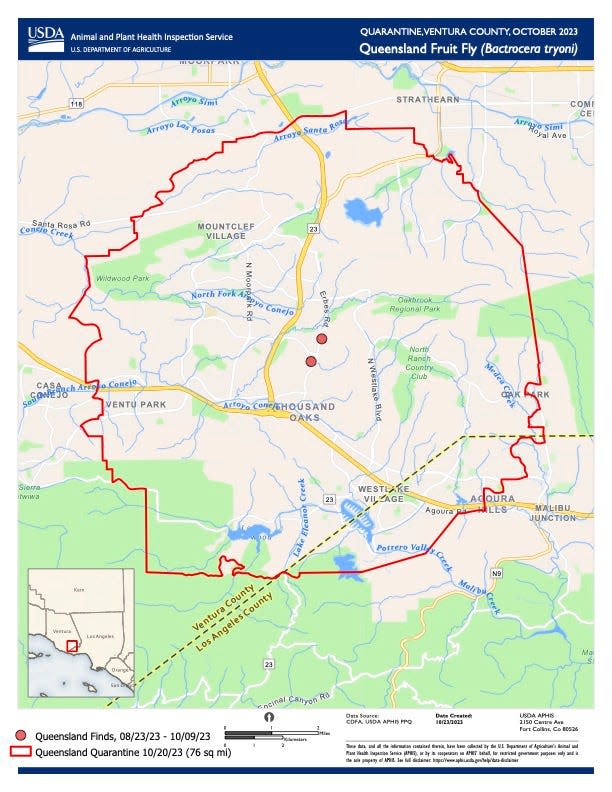Ventura County issues second quarantine after invasive fruit fly found in Thousand Oaks
State officials have placed roughly 76 square miles in Ventura and Los Angeles counties under a quarantine after two Queensland fruit flies were found in Thousand Oaks.
The insect native to Australia targets scores of fruit and vegetable crops, from strawberries to avocados. The female flies lay eggs that hatch into maggots and tunnel into the flesh of the fruit, officials said. The quarantine is put in place to try to control the spread until the insect can be eradicated from the area.
It was the second quarantine declared locally in a matter of weeks.
Earlier this month, the California Department of Food and Agriculture announced a citrus quarantine in the Santa Paula area. Officials had found two trees infected with a deadly bacterial disease referred to as HLB or citrus greening. The number has since climbed to 22 trees.
A quarantine is rare in the county, said Agricultural Commissioner Korinne Bell.
"Over the course of 17 years, we’ve only had three," Bell said. "Now, we have two new quarantines in the course of one month."
It is an anomaly happening statewide, officials said. A record 600 exotic fruit flies have been detected so far in 2023. An average year has 75.
Agency goes door to door
After years of drought, a rainy winter and spring likely contributed to the increase. The numbers also quickly ticked up as travel and global commerce resumed after dropping during the COVID-19 pandemic.
A Queensland fruit fly was first detected in September in a residential neighborhood in Thousand Oaks. When a second fly was discovered in the area, the quarantine was put in place.
The quarantine stretches north to south roughly from the Tierra Rejada Golf Club to the Las Virgenes Reservoir and east to west from Agoura Hills to Wildwood Park.

Officials urge residents in the area not to move any fruits or vegetables from their property. They can be consumed or processed where they are picked. If they are not consumed, officials asked that the fruit or vegetable be double bagged in plastic and put in a garbage bin, not one intended for green waste.
Residents within a smaller boundary — 200 meters of where a fruit fly was found — already may have gotten a visit from the California Department of Food and Agriculture, officials said. In those areas, staff will let people know about the quarantine and schedule a time to treat plants with an organic-approved pesticide called Spinosad, the department said.
Officials seek public's help
Inspectors also will cut open samples of fruit and vegetables to look for any fruit fly larvae. If they find larvae, they will remove and dispose of fruit within 100 meters of the spot.
In the larger quarantine area, residents also may see staff placing traps around their neighborhoods. The traps use a pheromone lure that targets exotic fruit flies, according to the state agency.
For farmers in the quarantine area, the rules require a complex treatment process for fruits and vegetables, according to Bell. Because of the time required, some crops could spoil before they can be sold.
In both quarantines, the initial detection was found in residential areas. Now, officials say they need the public's help to stop the spread. Some residents have refused to let the work happen, and Bell hopes more outreach about the process may help.
"We really need the residents' cooperation," she said. "There's a lot at stake."
More information and an interactive map of the quarantine is available at cdfa.ca.gov/plant/qff/regulation.html. Residents also may call the state's pest hotline at 1-800-491-1899.
Cheri Carlson covers the environment and county government for the Ventura County Star. Reach her at cheri.carlson@vcstar.com or 805-437-0260.
This article originally appeared on Ventura County Star: Ventura County issues quarantine due to invasive fruit flies
